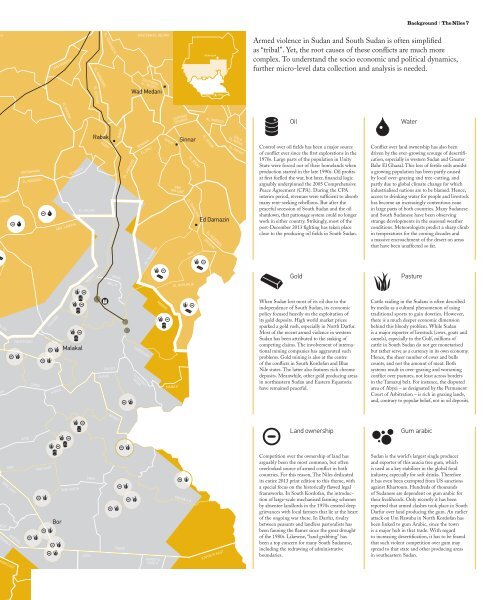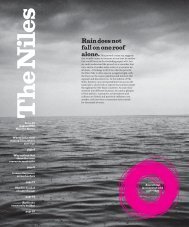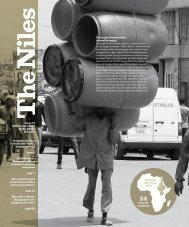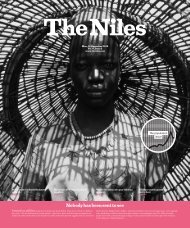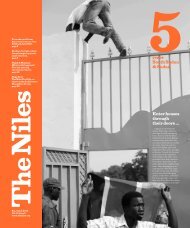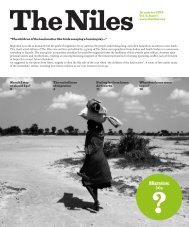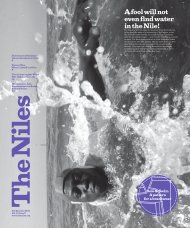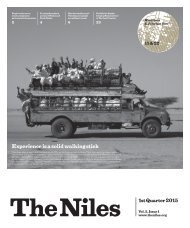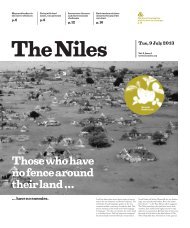If the evil is coming, shut the door...
Approximately three million small arms are circulating in Sudan and South Sudan. In the fourth edition of The Niles, our correspondents from both countries take a closer look: Where do the weapons come from? What societal role do they play? But most importantly: How many weapons are needed to establish peace and to ensure that the door on evil no longer has to be shut, as the above proverb suggests? A Darfuri fighter (photo), has a practical answer – a collection of talismans meant to protect him from bullets. But will it protect him from the person with his finger on the trigger? Albert Einstein, whose Theory of Relativity was proven in a 1952 experiment carried out in Sudan said: “The world will not be threatened by evil people rather by people who permit it.” Those words ring true here and will hopefully open another door and allow something good to slip in.
Approximately three million small arms are circulating in Sudan and South Sudan. In the fourth edition of The Niles, our correspondents from both countries take a closer look: Where do the weapons come from? What societal role do they play? But most importantly: How many weapons are needed to establish peace and to ensure that the door on evil no longer has to be shut, as the above proverb suggests? A Darfuri fighter (photo), has a practical answer – a collection of talismans meant to protect him from bullets. But will it protect him from the person with his finger on the trigger? Albert Einstein, whose Theory of Relativity was proven in a 1952 experiment carried out in Sudan said: “The world will not be threatened by evil people rather by people who permit it.” Those words ring true here and will hopefully open another door and allow something good to slip in.
You also want an ePaper? Increase the reach of your titles
YUMPU automatically turns print PDFs into web optimized ePapers that Google loves.
AKOBO<br />
Juba<br />
Background | The Niles 7<br />
L SHEIKH EASTERN EL GEZIRA<br />
UMM RAMTTA<br />
EL HASAHEESA<br />
Khartoum<br />
Armed violence in Sudan and South Sudan <strong>is</strong> often simplified<br />
as “tribal”. Yet, <strong>the</strong> root causes of <strong>the</strong>se conflicts are much more<br />
complex. To understand <strong>the</strong> socio economic and political dynamics,<br />
fur<strong>the</strong>r micro-level data collection and analys<strong>is</strong> <strong>is</strong> needed.<br />
EL MANAGEEL<br />
EL GUTAINA<br />
SOUTHERN<br />
EL GEZIRA<br />
Wad Medani<br />
Juba<br />
Gedaref<br />
EL DOUIEM<br />
EASTERN<br />
SENNAR<br />
AL MAFAZA<br />
Oil<br />
Water<br />
beid<br />
RASHAD<br />
UM RAWABA<br />
EL ABASSIYA<br />
ABU JUBAIHA<br />
TENDALTI<br />
EL SALAM<br />
Rabak<br />
KOSTI<br />
RABAK<br />
EL JABALIAN<br />
SENNAR<br />
EL DALI<br />
AL TADAMON<br />
SINGA<br />
ABU<br />
HOUJAR<br />
Sinnar<br />
EL SOUKI<br />
EL DAMAZINE<br />
BAU<br />
EL DINDIR<br />
Ed Damazin<br />
EL ROSEIRES<br />
GEISSAN<br />
QALA<br />
EL NAHAL<br />
EL RAHAD<br />
Control over oil fields has been a major source<br />
of conflict ever since <strong>the</strong> first explorations in <strong>the</strong><br />
1970s. Large parts of <strong>the</strong> population in Unity<br />
State were forced out of <strong>the</strong>ir homelands when<br />
production started in <strong>the</strong> late 1990s. Oil profits<br />
at first fuelled <strong>the</strong> war, but later, financial logic<br />
arguably underpinned <strong>the</strong> 2005 Comprehensive<br />
Peace Agreement (CPA). During <strong>the</strong> CPA<br />
interim period, revenues were sufficient to absorb<br />
many rent-seeking rebellions. But after <strong>the</strong><br />
peaceful secession of South Sudan and <strong>the</strong> oil<br />
<strong>shut</strong>down, that patronage system could no longer<br />
work in ei<strong>the</strong>r country. Strikingly, most of <strong>the</strong><br />
post-December 2013 fighting has taken place<br />
close to <strong>the</strong> producing oil fields in South Sudan.<br />
Conflict over land ownership has also been<br />
driven by <strong>the</strong> ever-growing scourge of desertification,<br />
especially in western Sudan and Greater<br />
Bahr El Ghazal. Th<strong>is</strong> loss of fertile soils amidst<br />
a growing population has been partly caused<br />
by local over-grazing and tree-cutting, and<br />
partly due to global climate change for which<br />
industrial<strong>is</strong>ed nations are to be blamed. Hence,<br />
access to drinking water for people and livestock<br />
has become an increasingly contentious <strong>is</strong>sue<br />
in large parts of both countries. Many Sudanese<br />
and South Sudanese have been observing<br />
strange developments in <strong>the</strong> seasonal wea<strong>the</strong>r<br />
conditions. Meteorolog<strong>is</strong>ts predict a sharp climb<br />
in temperatures for <strong>the</strong> <strong>coming</strong> decades and<br />
a massive encroachment of <strong>the</strong> desert on areas<br />
that have been unaffected so far.<br />
MANYO<br />
RENK<br />
MELUT<br />
EL KURUMUK<br />
Gold<br />
Pasture<br />
ARIANG<br />
TALODI<br />
FANGAK<br />
PANYIKANG<br />
CANAL<br />
FASHODA<br />
MALAKAL<br />
NYIROL<br />
Malakal<br />
ULANG<br />
BALIET<br />
LOGOCHUK<br />
LUAKPINY<br />
NASIR<br />
MABAN<br />
MAIWUT<br />
When Sudan lost most of its oil due to <strong>the</strong><br />
independence of South Sudan, its economic<br />
policy focused heavily on <strong>the</strong> exploitation of<br />
its gold deposits. High world market prices<br />
sparked a gold rush, especially in North Darfur.<br />
Most of <strong>the</strong> recent armed violence in western<br />
Sudan has been attributed to <strong>the</strong> staking of<br />
competing claims. The involvement of international<br />
mining companies has aggravated such<br />
problems. Gold mining <strong>is</strong> also at <strong>the</strong> centre<br />
of <strong>the</strong> conflicts in South Kordofan and Blue<br />
Nile states. The latter also features rich chrome<br />
deposits. Meanwhile, o<strong>the</strong>r gold producing areas<br />
in nor<strong>the</strong>astern Sudan and Eastern Equatoria<br />
have remained peaceful.<br />
Cattle raiding in <strong>the</strong> Sudans <strong>is</strong> often described<br />
by media as a cultural phenomenon of using<br />
traditional sports to gain dowries. However,<br />
<strong>the</strong>re <strong>is</strong> a much deeper economic dimension<br />
behind th<strong>is</strong> bloody problem. While Sudan<br />
<strong>is</strong> a major exporter of livestock (cows, goats and<br />
camels), especially to <strong>the</strong> Gulf, millions of<br />
cattle in South Sudan do not get monetar<strong>is</strong>ed<br />
but ra<strong>the</strong>r serve as a currency in its own economy.<br />
Hence, <strong>the</strong> sheer number of cows and bulls<br />
counts, and not <strong>the</strong> amount of meat. Both<br />
systems result in over-grazing and worsening<br />
conflict over pastures, not least across borders<br />
in <strong>the</strong> Tamazuj belt. For instance, <strong>the</strong> d<strong>is</strong>puted<br />
area of Abyei – as designated by <strong>the</strong> Permanent<br />
Court of Arbitration – <strong>is</strong> rich in grazing lands,<br />
and, contrary to popular belief, not in oil deposits.<br />
AYOD<br />
Land ownership<br />
Gum arabic<br />
YIROL WEST<br />
TEREKEKA<br />
DUK<br />
YIROL EAST<br />
MUNDRI EAST<br />
AWERIAL<br />
TWIC EAST<br />
Bor<br />
BOR SOUTH<br />
UROR<br />
PIBOR<br />
LOPA KAPOETA<br />
NORTH<br />
POCHALLA<br />
KAPOETA EAST<br />
Competition over <strong>the</strong> ownership of land has<br />
arguably been <strong>the</strong> most common, but often<br />
overlooked source of armed conflict in both<br />
countries. For th<strong>is</strong> reason, The Niles dedicated<br />
its entire 2013 print edition to th<strong>is</strong> <strong>the</strong>me, with<br />
a special focus on <strong>the</strong> h<strong>is</strong>torically flawed legal<br />
frameworks. In South Kordofan, <strong>the</strong> introduction<br />
of large-scale mechan<strong>is</strong>ed farming schemes<br />
by absentee landlords in <strong>the</strong> 1970s created deep<br />
grievances with local farmers that lie at <strong>the</strong> heart<br />
of <strong>the</strong> ongoing war <strong>the</strong>re. In Darfur, rivalry<br />
between peasants and landless pastoral<strong>is</strong>ts has<br />
been fanning <strong>the</strong> flames since <strong>the</strong> great drought<br />
of <strong>the</strong> 1980s. Likew<strong>is</strong>e, “land grabbing” has<br />
been a top concern for many South Sudanese,<br />
including <strong>the</strong> redrawing of admin<strong>is</strong>trative<br />
boundaries.<br />
Sudan <strong>is</strong> <strong>the</strong> world’s largest single producer<br />
and exporter of th<strong>is</strong> acacia tree gum, which<br />
<strong>is</strong> used as a key stabil<strong>is</strong>er in <strong>the</strong> global food<br />
industry, especially for soft drinks. Therefore<br />
it has even been exempted from US sanctions<br />
against Khartoum. Hundreds of thousands<br />
of Sudanese are dependent on gum arabic for<br />
<strong>the</strong>ir livelihoods. Only recently it has been<br />
reported that armed clashes took place in South<br />
Darfur over land producing <strong>the</strong> gum. An earlier<br />
attack on Um Rawaba in North Kordofan has<br />
been linked to gum Arabic, since <strong>the</strong> town<br />
<strong>is</strong> a major hub in that trade. With regard<br />
to increasing desertification, it has to be feared<br />
that such violent competition over gum may<br />
spread to that state and o<strong>the</strong>r producing areas<br />
in sou<strong>the</strong>astern Sudan.<br />
Juba


